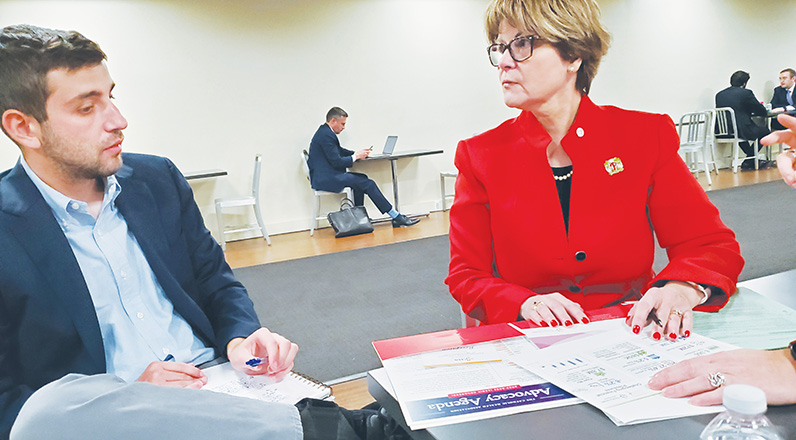
Josh Kramer, a staff member of Sen. Bob Casey, D-Pa., visits with Cathy Cardillo, Trinity Health MidAtlantic regional advocacy director. Cardillo was part of a contingent of Trinity Health advocates who met with staff of congressional offices
of both political parties during CHA's mid-October Advocacy Days. The Trinity Health advocates spoke extensively with their mission leader colleagues to prepare for the visits.
WASHINGTON — For the first time, CHA this year encouraged system mission leaders to join their advocacy colleagues at the association's Advocacy Days, which took place here Oct. 18 and 19.
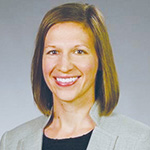 Barina
BarinaHospital Sisters Health System was among the ministry systems that took CHA up on the invitation. HSHS Chief Mission Officer Rachelle Barina joined HSHS President and CEO Damond Boatwright on multiple visits with the staffs of Congress members representing
the Illinois and Wisconsin communities HSHS serves.
It was Barina's first time making such visits on Capitol Hill. She said that "having the opportunity as a mission leader to join conversations with our representatives" enabled her and Boatwright, chair of CHA's board, to bring the government representatives'
attention to topics like social need, community health and community benefit.
"These are central matters for our ministry and our representatives were appreciative for the dialogue," Barina said.
In an interview after the visits, she said, "What I found especially interesting was the questions that our representatives had for us. They are extremely interested and even invested in the strength of local health care organizations, and they had fantastic
questions for us.
"It really was a dialogue, with information and insight exchanged both ways," she recalled.
On the Hill
During Advocacy Days, ministry representatives gather in Washington to learn about government activity impacting Catholic health care and meet in-person with their senators and representatives. CHA had hosted the gathering
every year for decades until the COVID-19 pandemic paused in-person events. This year, about three dozen ministry advocacy leaders, more than a dozen mission leaders and other top executives attended.
During the first part of each of the two days, attendees heard from congressional and Biden administration staffers as well as representatives of CHA and partner organizations. These presenters spoke about congressional and administration agendas, the
political environment more broadly and potential impacts on Catholic health care. During the afternoons of both days, attendees went to the Hill for meetings with Congress members of both political parties and their staffs.
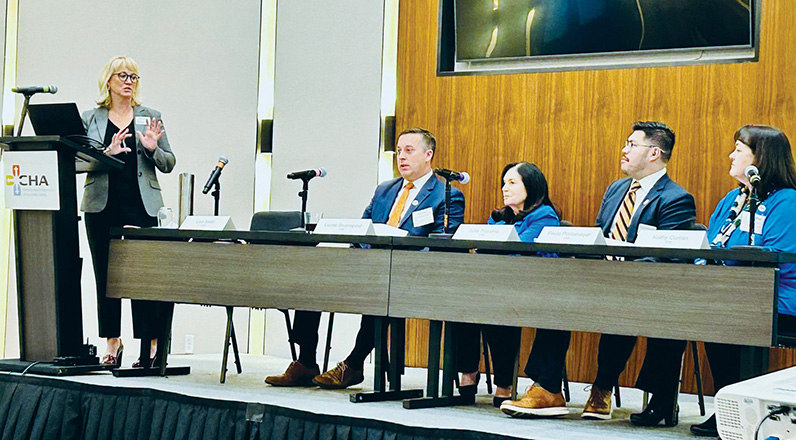
CHA governmental affairs experts prepare CHA members for Capitol Hill visits that were part of Advocacy Days in October. From left are Vice President of Advocacy and Public Policy Lisa Smith, Senior Director of Government Relations Lucas Swanepoel,
Senior Director of Community Benefit and Continuing Care Julie Trocchio, Senior Director of Government Relations Paulo Pontemayor, and Senior Director of Public Policy Kathy Curran. Also presenting at Advocacy Days were congressional staff
of both political parties, a Biden administration representative and staff of CHA partner organizations.
The ministry leaders took part in about 200 Hill visits.
Right time
CHA Senior Director of Mission Innovation and Integration Dennis Gonzales explained that the idea for involving mission leaders in Advocacy Days flowed from recent CHA efforts to elevate the mission leader role in Catholic
health care, including by ensuring mission leader competency in seven broad areas.
When ministry mission leader Sara Lee of Mercy told CHA staff about her desire to delve deeper into the advocacy competency, that spurred Gonzales and his colleagues to look for ways to increase the interaction between mission and advocacy leaders
at the national level. They saw Advocacy Days as one opportunity to do this.
CHA President and CEO Sr. Mary Haddad, RSM, told mission leader attendees that "having you here now is timely and necessary" in part because of increased challenges to and scrutiny of Catholic health care providers given their not-for-profit status.
She said the ministry has "a distinct voice because we are grounded in mission and lead with mission," and mission leaders are very well positioned to be that voice.
'Perfect marriage'
Rob Tasman, one of two Franciscan Missionaries of Our Lady Health System mission leaders who attended Advocacy Days, said their involvement in the event was "incredibly affirming" of the direction that system has
been heading.
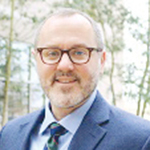 Tasman
TasmanTasman was executive director of the Louisiana Conference of Catholic Bishops for seven years before becoming vice president of mission integration for FMOLHS's Our Lady of Lourdes Regional Medical Center in Lafayette, Louisiana, in 2021. Given the strong
advocacy component of his former role, he's been advising FMOLHS Senior Vice President of Mission Integration Pete Guarisco Jr. on ways to increase mission leaders' interconnection with advocacy representatives across the system.
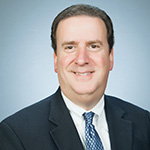 Guarisco
GuariscoThe mission leaders have been forging relationships with state and local policymakers, in close collaboration with their advocacy colleagues. Those efforts proved beneficial when Guarisco and Tasman met during Advocacy Days with the staff of Rep. Clay
Higgins, R-La., Guarisco said. One of the congressman's staff members, he said, "was very impressed with hearing our story from a mission perspective."
Tasman added that mission and advocacy are "the perfect marriage" for Catholic health care. "The advocates understand the process and know the players, they can present the data. But they need stories and points of connection, and mission leaders are
poised to provide that because of how we interact with and serve the community."
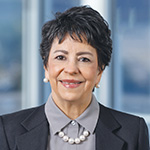 Armijo-Etre
Armijo-Etre'Boots on the ground'
CHRISTUS Health Regional Vice President of Mission and Spirituality Kathy Armijo-Etre was part of a contingent of CHRISTUS mission and advocacy leaders who visited the offices of two senators and one representative
from states CHRISTUS serves. Armijo-Etre's advocacy colleagues helped her prepare by suggesting that she share "the stories of caring for patients and responding to the community that are unique to Catholic health care."
She said because she is "boots on the ground," working directly with CHRISTUS programs serving vulnerable people, she was able to share the many ways that the ministry cares for people and the devastating impacts that threats to Catholic health care could
have on communities.
For instance, she was able to tell the government officials about a CHRISTUS program for those who use emergency departments frequently for nonemergent care and who have debilitating behavioral health conditions. She told them about program participants
who got help accessing social services and whose basic needs were met. This reduced their use of the emergency department. The program could be at risk if Catholic health care's funding is cut, she told officials during the Hill visits.
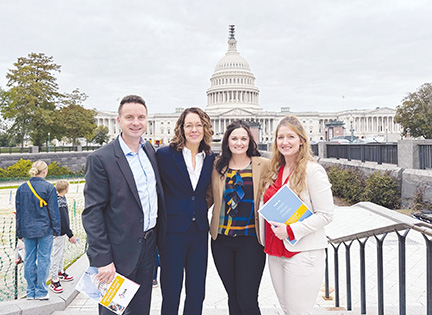 Chesterfield, Missouri-based Mercy paired advocacy and mission team members for Capitol Hill visits during CHA's Advocacy Days. From left are Vice President of Mission and Ministry Nelu Nedelea, Vice President of Mission Sara Lee, Director of Government
Relations for Mercy Arkansas Jenna Goldman and Government Relations Manager Kayla Allison.
Chesterfield, Missouri-based Mercy paired advocacy and mission team members for Capitol Hill visits during CHA's Advocacy Days. From left are Vice President of Mission and Ministry Nelu Nedelea, Vice President of Mission Sara Lee, Director of Government
Relations for Mercy Arkansas Jenna Goldman and Government Relations Manager Kayla Allison.Rootedness
While constraints prevented Trinity Health from having mission leaders join governmental affairs staff at Advocacy Days, there was a mission focus to the advocates' preparations for the event, said Tina Weatherwax-Grant,
Trinity Health senior vice president of public policy and advocacy. The dozen or so members of the advocacy team who made Hill visits had had a "robust conversation" with Rev. Dr. Kirtley Yearwood before their meetings. Rev. Yearwood is chief mission
officer of Trinity Health's Holy Cross Health in Silver Spring, Maryland.
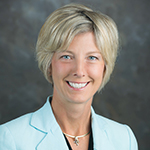 Weatherwax-Grant
Weatherwax-GrantHe reminded them of the importance of proximity and authenticity with each other and with the congressional delegates they were meeting. He also advised them to lead with the mission instead of treating it as an afterthought.
Weatherwax-Grant noted that prior to Advocacy Days, Trinity Health already had been strengthening the link between mission and advocacy roles, and that will continue. Mission leaders help staff Trinity Health's system-level council that shapes its advocacy
agenda, take part in regional advocacy planning, help develop advocacy messaging and provide governmental affairs staff with real-life stories showing the value of Catholic health care.
"This rootedness in mission and faith is essential for advocacy," she said.
Evolution
Lee, Mercy vice president of mission, said CHA's move to involve mission leaders in Advocacy Days is an evolution for the association. She said it shows that CHA is open to change and to bolstering the connections between
these important aspects of ministry.
She was also new to Hill visits but believes that she and other mission leaders who were part of the delegation were able to "carry the identity and legacy" of Mercy to the visits.
Lee said she and other mission leaders helped include in the conversations on the Hill the potential downstream effects that political and legislative decisions can have on vulnerable populations.
Even more important, she said, was that she believes that their focus on mission "brings hope ... Our role is to inspire."